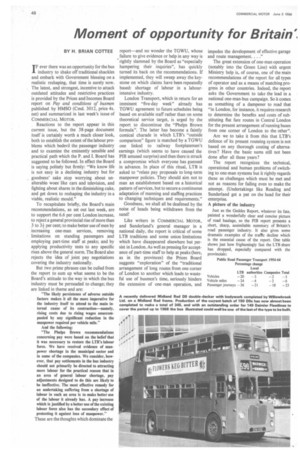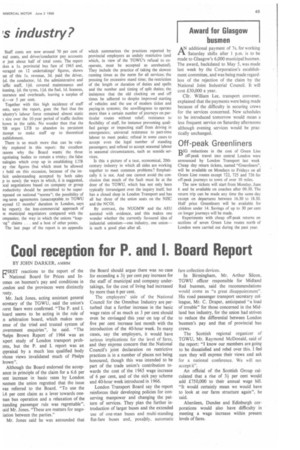Moment of opportunity for Britain s industry?
Page 50

Page 51

If you've noticed an error in this article please click here to report it so we can fix it.
BY H. BRIAN COTTEE
17 ever there was an opportunity for the bus .II. industry to shake off traditional shackles and embark with Government blessing on a realistic reshaping, that time is surely now. The latest, and strongest, incentive to attack outdated attitudes and restrictive practices is provided by the Prices and Incomes Board report on Pay and conditions of busmen published by HMSO (Cmd. 3012, price 4s. net) and summarized in last week's issue of COMMERCIAL MOTOR.
Reactions to the report appear in this current issue, but the 38-page document itself is certainly worth a much closer look, both to establish the extent of the labour problems which bedevil the passenger industry and to examine the eminently sensible and practical path which the P. and I. Board has suggested to be followed. In effect the Board is saying politely but firmly: "We know life is not easy in a declining industry but for goodness' sake stop worrying about unalterable woes like cars and television, and fighting about shares in the diminishing cake, and get down to reshaping the industry in a viable, realistic mould."
To recapitulate briefly, the Board's main recommendations, as set out last week, are to support the 6.6 per cent London increase, to reject a general provincial rise of more than 3 to 3+ percent; to make better use of men by increasing one-man services, removing limitations on standing passengers and employing part-time staff at peaks; and by applying productivity tests to any specific rises above the general norm. The Board also rejects the idea of joint pay negotiations covering the industry nationally.
But two prime phrases can be culled from the report to sum up what seems to be the Board's attitude to the way in which the bus industry must be persuaded to change; they are linked in theme and are:
"The likely persistence of adverse outside factors makes it all the more imperative for the industry itself to attend to the main internal cause of its contraction—namely, rising costs due to rising wages unaccompanied by any significant reduction in the manpower required per vehicle mile."
And the following: "The Phelps Brown recommendations concerning pay were based on the belief that it was necessary to restore the LTB's labour Force. We have received evidence of manpower shortage in the municipal sector and in some of the companies. We consider, however, that pay settlements in the bus industry should not primarily be directed to attracting more labour for the practical reason that in an area of general labour shortage, pay adjustments designed to do this are likely to be ineffective. The most effective remedy for an undertaking suffering from a shortage of labour in such an area is to make better use of the labour it already has. A pay increase which is justified by a better use of the existing labour force also has the secondary effect of protecting it against loss of manpower." These are the thoughts which dominate the
report—and no wonder the TGWU, whose failure to give evidence or help in any way is rightly slammed by the Board as "especially hampering their inquiries", has quickly turned its back on the recommendations. If implemented, they will sweep away the keystone on which claims have been repeatedly based: shortage of labour in a labourintensive industry.
London Transport, which in return for an imminent "five-day week" already has TGWU agreement to future schedules being based on available staff rather than on some theoretical service target, is urged by the report to discontinue the "Phelps Brown formula". The latter has become a faintly comical charade in which LTB's "outside comparison" figure is matched by a TGWU one linked to railway footplatemen's earnings (which seems to have caused the PIB amused surprise) and then there is struck a compromise which everyone has guessed in advance. In place of this ritual, LTB is asked to "relate pay proposals to long-term manpower policies. They should aim not to man an establishment based on a historical pattern of services, but to secure a continuous adaptation of manning and staffing practices to changing techniques and requirements."
Goodness, we shall all be deafened by the noise of heads being withdrawn from the sand I
Like writers in COMMERCIAL MOTOR, and Sunderland's general manager in a national daily, the report is critical of some LTB traditions and some union limitations which have disappeared elsewhere but persist in London. As well as pressing for acceptance of part-time staff to help at peaks (here, as in the provinces) the Prices Board suggests "exploration" of the "traditional arrangement of long routes from one corner of London to another which leads to wasteful use of busmen's time, seriously hinders the extension of one-man operation, and
impedes the development of effective garage and route management. . . ."
The great extension of one-man operation (notably into the Green Line) with urgent Ministry help is, of course, one of the main recommendations of the report for all types of operator and as a means of matching progress in other countries. Indeed, the report asks the Government to take the lead in a national one-man-bus campaign. So it comes as something of a dampener to read that "in London, for instance, it requires research to determine the benefits and costs of substituting flat fare routes in Central London for the present arrangement of running buses from one corner of London to the other".
Are we to take it from this that LTB's defence of its present routeing system is not based on any thorough costing of alternatives? Have the basic sums still not been done after all these years?
The report recognizes the technical, operational and human problems of switching to one-man systems but it rightly regards these as challenges which must be met and not as reasons for failing even to make the attempt. (Undertakings like Reading and Sunderland get a pat on the head for their enterprise.
A picture of the industry
Just as the Geddes Report, whatever its fate, painted a wonderfully clear and concise picture of road haulage, so the PIB report presents a short, sharp, assimilable summary of Britain's road passenger industry. It also gives some dramatic examples of the traffic decline which is the essential cause of the report. One table shows just how frighteningly fast the LTB share has dropped, especially compared with the provincials: Staff costs are now around 70 per cent of )tal costs, and driver/conductor pay accounts r just about half of total costs. The report tkes a Is. provincial bus fare of 1965 and, veraged on 12 undertakings' figures, shows tat of this Is. revenue, 3d. paid the driver, -14. the conductor, Id. the administrative and staff, lid. covered maintenance and leaning, id. the tyres, lid. the fuel, Id. licences, isurance and overheads, !caving a surplus of d.—or 5 per cent.
Together with this high incidence of staff osts, says the report, goes the fact that the Klustry's labour force remained almost static size over the 10-year period of traffic decline hown in the table. No wonder then that the 'IB urges LTB to abandon its persistent ttempt to make staff up to theoretical ttablishment.
There is so much more that can be valubly explored in this report: the excellent :asons why the Board wants the three egotiating bodies to remain a trinity; the false nalogies which crop up in establishing LTB ay rise figures (but which must be allowed ) hold on this occasion, because of the imlicit understanding accepted by both sides p to now); the ways in which, it is suggested, )cal negotiations based on company or group roductivity should be permitted to be supernoosed on national "norms"; the possibility of mg-term agreements (unacceptable , to TGWU eyond 12 months' duration in London, says he report); the less-commercial approach of le municipal negotiators compared with the ompanies; the way in which the unions "leap'og" claims . . and a host of other points.
The last page of the report is an appendix which summarizes the practices reported by provincial employers as unduly restrictive (and which, in view of the TGWU's refusal to cooperate, must be accepted as unrebutted). They include the practice of taking the slowest running times as the norm for all services; the pressing for excessive stand time; the restriction of the length or duration of duties and spells and the number and timing of split duties; thc insistence that the old clocking on and off times be adhered to despite improved starting of vehicles and the use of modern ticket and paying-in systems; the unwillingness to operate more than a certain number of journeys on particular routes without relief; resistance to flexibility of staff, for instance preventing qualified garage or inspecting staff from driving in emergencies; universal resistance to part-time labour to meet peaks; refusal in some cases to accept even the legal number of standing passengers; and refusal to accept seasonal labour in seasonal circumstances, such as seaside services.
Is this a picture of a taut, economical, 20th century industry in which all sides are working together to meet common problems? Emphatically it is not. And one cannot avoid the conclusion that much of the fault must lie at the door of the TGWU, which has not only been typically intransigent over the inquiry itself, but has a closed shop in London Transport and has all but three of the union seats on the NJIC and the NC01.
By contrast, the NUGMW and the AEU assisted with evidence, and this makes one wonder whether the currently favoured idea of industrial unionism—one industry, one union-is such a good plan after all.








































































































































































